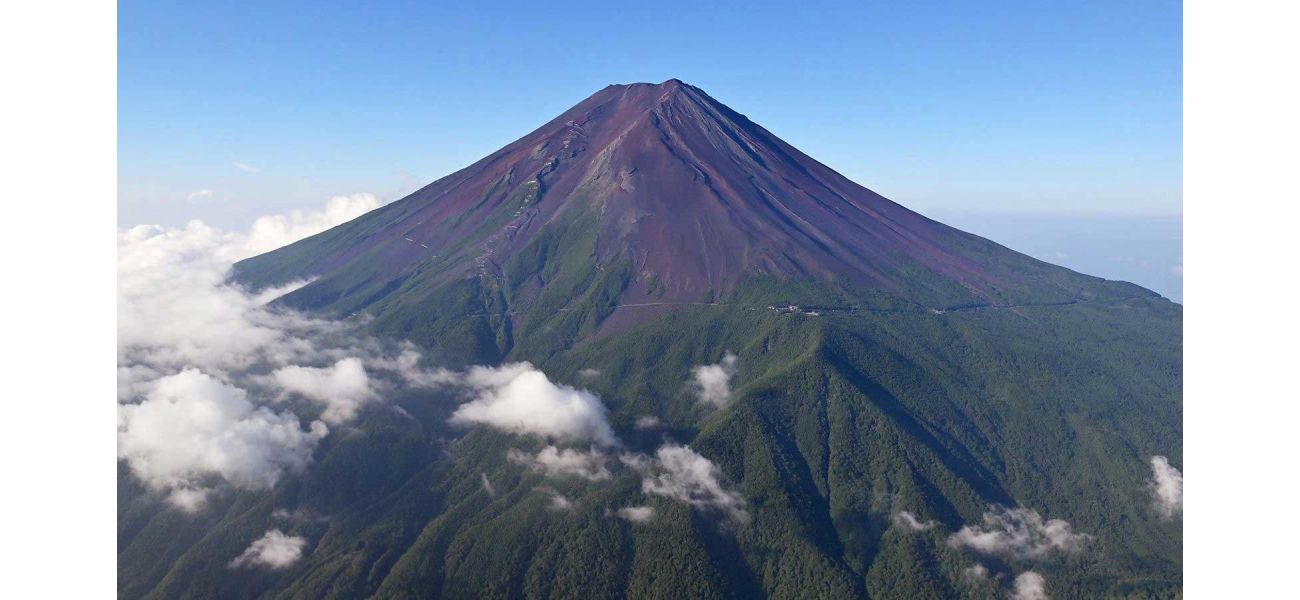Record-breaking: Mount Fuji has no snow for the first time in 130 years.
Mount Fuji in Japan is currently snowless in November, which is the latest this has happened in 130 years.
October 30th 2024.

November is quickly approaching, but Japan's beloved Mount Fuji has yet to be coated in its customary blanket of snow. This is the latest date in 130 years that the iconic mountain has remained bare, a concerning sign of the effects of the climate crisis.
Typically, the first snowfall on Mount Fuji occurs in early October, signaling the arrival of winter and the end of the summer climbing season. However, this year, the season ended on September 10 without any snow. The average date for snow to start forming on Mount Fuji is October 2, and last year it was recorded on October 5. But this year, the summit has remained snowless even as we approach the end of October.
According to Japan's weather agency, the lack of snow on Mount Fuji is due to warm temperatures and heavy rainfall. The Kofu Local Meteorological Office, which has been announcing the first snowfall on the mountain since 1894, has yet to do so this year. Meteorological officer Shinichi Yanagi explained that the high temperatures and rain have prevented any snow from falling.
This is the first time in recorded history that Mount Fuji has remained snowless as of October 29, beating the previous record of October 26 set in 1955 and 2016. This year, Japan experienced its hottest summer on record, with temperatures 1.76 degrees Celsius above normal. This is even higher than the previous record set in 2010. The unusually warm temperatures continued into the fall, with at least 74 cities recording temperatures of 30 degrees Celsius or higher in the first week of October.
The record-breaking heat in Japan this year is part of a global trend, with 2024 on track to be the hottest year on record. The climate crisis, driven by human activities such as burning fossil fuels, is a major factor in this extreme weather. Scientists warn that if we do not limit global warming to 1.5 degrees above pre-industrial levels, we will face catastrophic impacts.
The lack of snow on Mount Fuji is not just a concern for tourism and the economy, but also for the environment. A study in January found that the climate crisis has reduced snowpack in most parts of the Northern Hemisphere in the last 40 years. This could have far-reaching effects on local ecosystems, food and water supplies, and even allergies.
Mount Fuji, a UNESCO World Heritage site and an iconic symbol of Japan, is usually coated in snow for most of the year. However, in recent years, the mountain has faced issues with overtourism, resulting in litter, overtaxed facilities, and accidents. To manage the crowds, a new tourist tax and regulations have been put in place, with a daily limit of 4,000 climbers and a fee of 2,000 yen per person.
The lack of snow on Mount Fuji serves as a reminder of the urgent need to address the climate crisis and protect our planet for future generations. As we continue to experience extreme weather events and record-breaking temperatures, it is essential that we take action to reduce our impact on the environment and preserve the natural beauty of iconic landmarks like Mount Fuji.
Typically, the first snowfall on Mount Fuji occurs in early October, signaling the arrival of winter and the end of the summer climbing season. However, this year, the season ended on September 10 without any snow. The average date for snow to start forming on Mount Fuji is October 2, and last year it was recorded on October 5. But this year, the summit has remained snowless even as we approach the end of October.
According to Japan's weather agency, the lack of snow on Mount Fuji is due to warm temperatures and heavy rainfall. The Kofu Local Meteorological Office, which has been announcing the first snowfall on the mountain since 1894, has yet to do so this year. Meteorological officer Shinichi Yanagi explained that the high temperatures and rain have prevented any snow from falling.
This is the first time in recorded history that Mount Fuji has remained snowless as of October 29, beating the previous record of October 26 set in 1955 and 2016. This year, Japan experienced its hottest summer on record, with temperatures 1.76 degrees Celsius above normal. This is even higher than the previous record set in 2010. The unusually warm temperatures continued into the fall, with at least 74 cities recording temperatures of 30 degrees Celsius or higher in the first week of October.
The record-breaking heat in Japan this year is part of a global trend, with 2024 on track to be the hottest year on record. The climate crisis, driven by human activities such as burning fossil fuels, is a major factor in this extreme weather. Scientists warn that if we do not limit global warming to 1.5 degrees above pre-industrial levels, we will face catastrophic impacts.
The lack of snow on Mount Fuji is not just a concern for tourism and the economy, but also for the environment. A study in January found that the climate crisis has reduced snowpack in most parts of the Northern Hemisphere in the last 40 years. This could have far-reaching effects on local ecosystems, food and water supplies, and even allergies.
Mount Fuji, a UNESCO World Heritage site and an iconic symbol of Japan, is usually coated in snow for most of the year. However, in recent years, the mountain has faced issues with overtourism, resulting in litter, overtaxed facilities, and accidents. To manage the crowds, a new tourist tax and regulations have been put in place, with a daily limit of 4,000 climbers and a fee of 2,000 yen per person.
The lack of snow on Mount Fuji serves as a reminder of the urgent need to address the climate crisis and protect our planet for future generations. As we continue to experience extreme weather events and record-breaking temperatures, it is essential that we take action to reduce our impact on the environment and preserve the natural beauty of iconic landmarks like Mount Fuji.
[This article has been trending online recently and has been generated with AI. Your feed is customized.]
[Generative AI is experimental.]
0
0
Submit Comment





